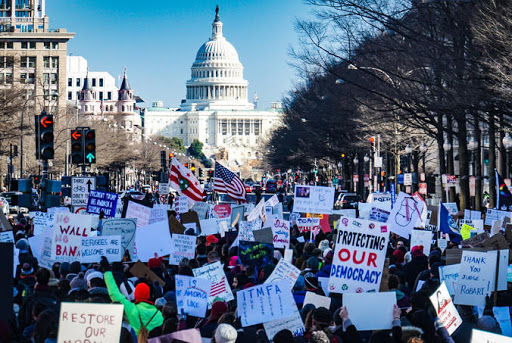Key Points:
- Donald Trump’s tenure has eroded the confidence of key democratic allies in the United States. So much so that the latter now doubt Washington’s loyalty and their commitment to ensuring their security in the medium and long term.
- Fear of Washington’s abandonment has prompted diverse reactions in allied capitals ranging from a desire to strengthen their alignment with the United States to an assumed strategic distancing.
- While the election of Joe Biden has reassured allies about America’s intentions in the next four years, it cannot erase Donald Trump’s legacy, any more than it can halt the relative decline of the United States and the shift of power to Asia. The Biden presidency will surely have a calming effect on relations with the allies, but it cannot resolve their strategic dilemma.
Context
America’s democratic allies are now celebrating the fact that Joe Biden is the president of the United States. During the presidential campaign, Biden reiterated his desire to bring the United States back to the centre of the international game by strengthening the bonds of trust with his allies in Europe and the Indo-Pacific region while promoting a multilateral approach in the management of the international issues. This may be short-lived, however, as it is unlikely that the United States will resume its role as the unchallenged hegemon to which it has accustomed us in the past. First, the exceptional conditions that favored the “unipolar moment” are a thing of the past. The rivalries between great powers and the conclusion of the Regional Comprehensive Economic Partnership remind us that a power transition is underway from the West to the East and that the Biden presidency will not change it. Next, the 74 million Americans who voted for Donald Trump last November confirmed that Trumpism was not a mistake, but a political force that Washington’s allies will have to contend with in the future. The assault on Capitol Hill on January 6 is a reminder of how far some radical elements of the movement are willing to go. Finally, the United States faces many challenges in domestic politics including the health crisis, the economic recession, but also the deep political divisions that will have the effect of weighing down American initiatives internationally. In short, this tense and uncertain context underscores the central dilemma facing Washington’s allies at the dawn of a Biden administration: strengthening their strategic alignment with America or, on the contrary, increasing their strategic autonomy, or even privileging their shift away from Washington, in order to anticipate the possible return of an administration hostile to multilateralism in January 2025.
Trump and the Fear of Abandonment
Over the past four years, President Trump’s rhetoric and the strategic incompetence of his administration have encouraged traditional allies to view the United States as a risk rather than a source of security. First, the 45th President strove to question alliances made with the allies. No alliance has been spared as both NATO and alliances with Japan, South Korea and Australia were denigrated during his tenure. Second, the Trump administration has disengaged from several international treaties, such as the Paris Agreement on Climate Change or the Trans-Pacific Partnership, but also from several international institutions, such as UNESCO and WHO. Over the past four years, Trump has eroded the confidence of his allies and has dramatically increased their fear of being abandoned by Washington in times of need.
That is why, despite their commitment to liberal international order, America’s historic allies have had to seriously anticipate the possibility of having to ensure their security and defense without Washington’s help. Evidence suggests, however, that these allies have reacted in disparate fashion since 2017 by adopting various strategies to deal with this risk.
Between Alignment and Strategic Distance
The range of strategies adopted by Washington’s allies can be summed up by four main strategic behaviors that have manifested themselves in recent years. The first is a strengthening of engagement with the United States. Some allies, such as Poland and Japan, have maintained or even deepened their security relations with Washington. Faced with real external threats and in the absence of a viable strategic alternative, these states have signaled their willingness to intensify their strategic alignment with Washington in order to demonstrate their loyalty, thus hoping to reduce the risks of abandonment on the part of Washington.
Hedging is the second strategy observed among several allies. This is about reducing the risk and losses associated with the uncertainty caused by Trump and the relative decline of the United States by diversifying its strategies. It is often embodied in an increase in defense capabilities and the desire to develop a certain autonomy in matters of foreign and defense policy, without losing the privileged link with Washington. Germany and Australia, which are good examples, believe that it is unrealistic to do without the United States altogether in defense. This is why German Defense Minister Annegret Kramp-Karrenbauer declared that “Europe remains dependent on American military protection, both nuclear and conventional, but [that] the United States cannot carry the banner of Western values alone.” With regard to Australia, the government plans to build a larger army while declaring itself attached to the security alliance which has united Australia and the United States since 1951. Therefore, these countries do not wish to distance themselves from the United States, but nevertheless remain aware that they are responsible for ensuring the stability of their regional environment.
The third behavior observed, especially in France, is strategic autonomy. The purpose of this is twofold. First, the objective is to have more influence in the resolution of international issues. The French initiative of the Forum for Peace is a good example. Second, this autonomy is intended to prepare for the eventuality that the United States no longer honors its commitments. For the supporters of this approach, it is necessary to build a European defense and thus work for autonomy in technological and strategic fields. This is notably the will of French President Emmanuel Macron.
Finally, the last strategy adopted by some allies is that of distancing or even changing alliances in favor of competing powers. This is the case with Turkey, which has distanced itself from Washington by drawing closer to Moscow and Beijing and which is working to establish a fully independent defense industry. Ankara is in fact increasingly antagonistic towards its NATO partners, in particular by purchasing S-400 defense systems from Russia, but also through its military engagement in Syria, Iraq, Libya, the Caucasus, and in the Mediterranean. President Erdogan also forged new strategic partnerships with Russia’s allies, Kazakhstan and Uzbekistan. These new agreements promote intelligence sharing, collaboration between defense industries and joint military exercises. Turkey is ultimately counting on China to diversify its economic and diplomatic relations. With the conclusion of 10 agreements since 2016, China has become Ankara’s second-largest trading partner after Russia. Erdogan thus favors economic and strategic opportunities over his historic relationship with the United States.
Can Joe Biden Ease the Allies’ Strategic Dilemma?
It is a truism to say that the Biden presidency is eagerly awaited in allied capitals. Especially since the 46th President of the United States wants to breathe new life into international action and cooperation. The appointment of Anthony Blinken as Secretary of State sends a clear signal in this regard. In particular, Biden pledged to organize a World Summit on Democracy during his first year in office to renew the spirit and common goals of democratic nations. He also intends to solidify international organizations that have been damaged by the Trump administration and displays unwavering loyalty to the Atlantic Alliance. Joe Biden can also rely on willing states like France in Europe or Australia and Japan in the Indo-Pacific to achieve these goals. These states indeed share the idea that China is a systemic competitor capable of destabilizing the international order. They also argue that allies must take responsibility for defense and actively participate in the management of their environment. France is thus intervening in Africa as part of the fight against terrorism, while Japan and Australia are stepping up multilateral initiatives to shape the Asian security architecture. Ultimately, these are states that are capable of evolving, through their high level of technology and interoperability, jointly with US military forces in the event of a major crisis. Thus, unlike his predecessor, Joe Biden’s style should stimulate coordination and the exchange of information between the United States and its allies.
According to Joe Biden, America is back. But will that be enough to alleviate the strategic dilemma faced by many allies? It seems at first glance unlikely that the allies will turn back the clock by somehow erasing the Trump years. In a context of relative decline of the United States, the diversification of economic, diplomatic and strategic ties will continue, as will the allies’ desire to become more independent of Washington. In 2021, Europeans agree on the idea that they must take responsibility for their own defense. This translates into an increase in their defense budget, cooperation between the defense industries of each country, as well as the institutionalization of European defense. Diversification and empowerment are also wills shared by close allies of the Indo-Pacific. The recent signing of a defense pact between Japan and Australia indicates that these two countries wish to continue their empowerment while maintaining a strong link with Washington.
Ultimately, the calming effect of a new Biden administration will not make deep existing differences between the United States and its allies disappear. They are economic and financial (agriculture, taxation of digital companies, regulation of online privacy), but above all strategic. Indeed, US foreign policy prioritizes rivalry with China, while Europe wants attention to focus primarily on terrorism and the resurgence of Russian aggression. The nature of responses to these threats also remains problematic. There is a certain reluctance among the allies to blindly follow the US strategy of confrontation with China.
Considerations and Recommendations for Canada
While European and Indo-Pacific allies have adopted mixed strategies in response to the actions of the Trump administration, Canada has for its part privileged its relationship with the United States, interdependence and geography oblige, despite tensions and disputes with President Trump.
Canada should take advantage of the Biden administration and of the relative stability it is expected to provide to advance the following initiatives. First, Canada should actively participate in strengthening the bonds of trust within NATO while maintaining its military contribution to deterrence measures in Eastern Europe and the Baltic States.
Second, Canada should build a clear strategy for Asia. Ottawa has so far been unable to define such a strategy. Canada could increase its participation in various multilateral mechanisms aimed at preventing crises and mitigating risks in this region. These forums are the right places to defend the values we deem essential. Canada could also deepen its relations with Indo-Pacific like-minded states such as Australia, Japan and South Korea. More specifically, strengthening the integration of defense industries as well as collaboration between the armed forces could be a favourable avenue. This could also result in signing strategic partnerships with these countries. There still needs to be political will and the allocation of additional resources, which is far from obvious in times of health and economic crisis.






Comments are closed.